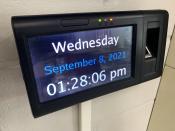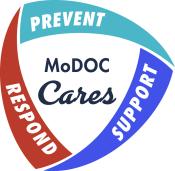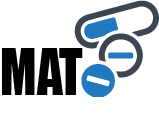Current Strategic Initiatives
Our mission in the Missouri Department of Corrections is to improve lives for safer communities.
Our strategic plan serves as a road map to guide us in that mission. Strategic initiatives — the actions we take to achieve our goals — support three major themes:
- Creating a safer work environment
- Developing our workforce
- Reducing risk and recidivism
The state’s business cycle runs on a fiscal year timeframe, this year from July 1, 2023, through June 30, 2024 (FY2024). Each year we articulate our priorities to support better government in Missouri through our strategic plan. In fiscal year 2024, our mission and our goals remain constant, but our strategic initiatives continue to evolve. We are building on past years' success and adding new priorities.
Here is what we are working on during the 2023 fiscal year:
Safer Work Environments
Implement Staffing Pattern & Shift Analysis:
We have analyzed work patterns at our facilities in order to determine the appropriate number of staff need to ensure safe, secure, and effective operation of our facilities. Implementation of this initiative includes adopting a shift relief factor (SRF) that is current; identifying appropriate posts that reflect each facility’s mission; determining appropriate staffing levels; and making alternate shift recommendations to accommodate staff and operational needs.

Increase Probation and Parole Fleet
This initiative supports the division’s focus on supervision in the community. With additional cars, probation and parole officers are better able to meet supervisees in their own communities, providing more meaningful supervision.
Implement Automated Time Keeping in Division of Adult Institutions

Site safety is enhanced when managers are able to effectively monitor the work environment and ensure staff are at their assigned posts at their assigned times. Installing an automated time-keeping system for tracking staff shifts streamlines monitoring processes and improves safety and security within our institutions. These changes can help us make sure our facilities and offices are properly staffed and can reduce unnecessary personnel expenses.unnecessary personnel expenses.
Identify Offender Management System
Finding an offender management system that allows staff to more efficiently conduct business and support offender success is essential. This initiative aims to identify an OMS that can accommodate our department.
Secure Funding for Offender Management System
In order to utilize an identified OMS, the department must have funding to initiate and upgrade the identified system. The department must obtain approval for the project through the Office of Administration.

Implement Improved External Classification System for Prison Security
The current classification system allows little flexibility in the management of individuals serving lengthy sentences or convicted of certain crimes that strain costly and scarce resources. This initiative will implement a classification process that assesses risk for misbehavior using an empirically driven classification tool, helping the department to maximize use of housing within adult institutions while maintaining safety and security.
Review and Update Internal Classification System for Prison Safety
The department uses an internal classification system to determine which offenders may be safely housed together. We will validate and update our tool to ensure we are using the most current, predictive information to classify potential housemates. This initiative will help us continue to promote a safe environment within our institutions for both offenders and staff.

Deploy Additional Mobile Custody Units
This initiative aims to provide additional custody staff who travel in teams to sites where staffing shortages are limiting the institution. Providing additional staff through a mobile unit allows for flexibility in staffing at facilities.
Deploy Cameras and Radios at Facilities
In a continuing effort to provide technology that makes the work environment safer, this initiative brings updated camera systems and radios into facilities.

Add Air Conditioning to Institutions
This initiative aims to provide air conditioning in facilities where it is not currently available. For FY24, Fulton Reception and Diagnostic Center will transition to an air conditioned facility.
Deploy 17 Additional Body Scanners in Facilities
This initiative aims to equip every facility with a body scanner. The use of body scanners helps detect contraband and creates a safer work environment.
Pilot Electronic Legal Mail

Contraband, especially drugs, delivered through postal mail threatens the health and safety of both offenders and staff within our institutions. Through a previous initiative, a consistent and efficient mail process was implemented to reduce the potential for staff exposure to dangerous substances and while continuing to provide access to personal correspondence for offenders. This initiative will pilot the new process with legal mail to continue making a safer environment for staff and offenders.
Improving the Workforce

Deploy Outreach and Support for DOC Staff Family Members
This initiative aims to provide families of corrections staff with support and information. The support of family is important for staff working in the field and within facilities.
Provide Financial Training for all Staff with Purchasing Authority
Staff who participate in procurement and business operations play a key role in ensuring timely submission of required information. Staff with purchasing authority will receive training to ensure they understand the process utilized for both procurement and business operations, thereby streamlining functions and sustaining good customer service.

Open the Western Training Academy
Providing custody staff with adequate and appropriate training for their job functions is more effective with hands-on learning. This initiative facilitates the opening of a training facility where new staff have the opportunity to learn and practice skills in an environment that reflects one in which they will work on a day-to-day basis. The hands-on learning model improves facility safety and security.
Open Staff Cafés at Facilities
Through our contracted vendor Aramark, staff dining cafés and grab-and-go markets will be set up in each institution to offer staff a variety of hot food options. Current staff dining will be remodeled.
Expand Trauma Support for Staff

For corrections employees, day-to-day events can result in trauma that, when not appropriately addressed, often leads to ongoing issues with absenteeism, work performance, morale and a host of other negative life impacts. This initiative seeks to continue improving how we respond to staff who have experienced traumatic events on the job, especially those on the front line, by providing support and resources for staff after these events. The purpose of this initiative is to improve both work and non-work life for all employees.
Expand Employee Health and Wellness
For corrections employees, health and wellness are vital components of day-to day work in a stressful environment. This initiative seeks to continue providing staff with health and wellness support and resources.
Implement and Train MOVERS
As the state transitions to a new system for procurement and business operations, the department will need to develop an implementation strategy. Upon implementation, staff who participate in procurement and business operations will need training to ensure timely submission of required information. Implementation and training for a new system will streamline functions and help sustain good customer service.

Expand Team Recruitment Efforts
As job vacancies persist across all divisions within the department, there is a need to expand our efforts to recruit staff. The goal of this initiative is to implement a consistent approach to recruitment and provide recruitment teams with training on best practices. .
Implement Zero Suicide Standards

Data suggest corrections personnel experience suicides rates 39% higher than those of the general population. Research has estimated that for every one death by suicide, at least 25 people will attempt suicide. This initiative aims to implement a screening and response process for employees in crisis to better support employees and their families.
Launch New Intranet Site

Giving staff timely access to current information and relevant tools is essential to our success. We aim to support staff-focused department goals such as more effective onboarding, improved staff retention and ongoing operational excellence by launching a user-centered website experience for our teams. This initiative helps ensure staff members have quick and easy access to the tools and information needed to do their jobs effectively.
Expand Facility Human Resources Capabilities
Human resource needs at institutions and transition centers have continued to increase and become more complex. A human resource manager at each facility will improve the quality of our work environments by providing staff with access to an on-site manager who specializes in Americans with Disability Act, Family Medical Leave Act, and other specialized employee personnel functions.
Adopt a Trauma-Informed Culture

We most efficiently progress toward our mission when we understand the underlying reasons Missourians come under the care of the department. Research consistently shows that the vast majority of offenders in our prisons have experienced significant and life-altering traumatic situations. This initiative aims to expand the work we do from a trauma-aware culture to a trauma-informed culture. By making this shift, we can better manage behavior within our institutions and increase our chances of helping people understand and change decisions and behaviors that lead to criminal justice involvement.
Improve Forms Software
One need identified as a result of changes in the department was better access to commonly used forms. This initiative aims to identify a process to manage and utilize forms within the department and develop a plan to make forms more accessible in electronic format.
Reducing Risk & Recidivism

Expand Higher Education Opportunities
We believe providing opportunities for pro-social activities such as obtaining a college degree improves the lives of correctional facility residents and supports economic growth for Missouri. This initiative seeks to expand higher-education opportunities to all institutions, providing free courses for offenders and reduced-cost courses for staff. Through this program, we support successful reentry for offenders while improving our workforce.
Implement Institutional Programming and Activities to Conform with Evidence-Based Practice
Research shows that correctional interventions can reduce the chance of future criminal justice system involvement. We aim to provide programs and activities that are proven to improve successful reintegration into society by former offenders. This initiative will begin implementation of programming and activities that have been identified as evidence based and that provide opportunities for skill building to enhance offenders’ opportunities for success.
Deploy Integrated Mental Health and Substance Use Treatment Philosophy and Standards across the Department
Many people in our prisons have both mental health and substance use disorders. We hope to improve outcomes and support recovery for residents affected by these issues. This initiative establishes consistent, coordinated and holistic behavioral health treatment in all department facilities, with a focus on core risk-reduction programming.
Implement Virtual Job Placement Services
The Department of Corrections aims to ensure clients have access to career services prior to their release from incarceration so they are able to gain meaningful employment within 30 days of their release with the goal of maintaining their employment at least nine months after their release. This initiative establishes the opportunity for clients being released to the St. Louis region to participate in virtual job fairs with Second Chance area employers. The St. Louis pilot with be followed by plans to expand to other regions of the state.
Expand Medication Assisted Treatment

The department has been offering Medication Assisted Treatment (MAT) in the form of prerelease Vivitrol injections for qualifying offenders completing institutional substance use treatment programs. MAT is an evidence-based treatment focused on helping opioid users’ recovery. In an effort to assist all appropriate offenders, the department is expanding MAT services to include all approved medications and making them available to all offenders prior to release with community follow up. Subsequent expansion will provide MAT to all offenders at any point in their incarceration.
Participate in Reentry 2030
Reentry 2030 is a national initiative to increase successful reintegration for every person. Missouri joins other agencies in participation in this national initiative.
Explore Electronic Tracking for Work Release
The department exploring GPS monitoring for work release offenders, with the goal of improving safety and security for the public while increasing the number of offenders developing job skills in our communities through work release programs.
Increase Participation in Improving Community Treatment Success (ICTS) Program

Improving Community Treatment Success (ICTS) is designed to help individuals with behavioral health issues become more successful while under supervision in the community. This initiative aims to expand the number of people served by the program and improve treatment completion.
Expand Community Arrest Program

This initiative, launched in FY20, equips and trains probation and parole officers to conduct arrests of probationers and parolees for whom active warrants have been issued at the direction of the courts or the Missouri Parole Board. This program has resulted in more than 900 arrests made by probation and parole officers since its inception. The program facilitates more timely intervention in response to violations and reduces the burden on local law enforcement. For FY24, the department has a pending new decision item in the budget, which would further expand this program by equipping and training an additional 36 officers.
Expand Community-Based Services
Through grant funding, this initiative establishes “pay for success” treatment services in St. Louis and surrounding counties.

Launch Mental Health Liaisons for Probation and Parole Supervision (Smart Probation Grant)
This initiative, through state and grant funding, establishes regional behavioral health specialists in all probation and parole regions. These behavioral health specialists will serve as liaisons to probation and parole officers to assist with finding services, identifying needs and providing training to probation and parole staff.
Initiate Southwest Community Supervision Center
This initiative aims to identify, in the southwest area of the state, a location to create a community supervision center.
Detailed strategic initiative information is available to staff on the K drive.




